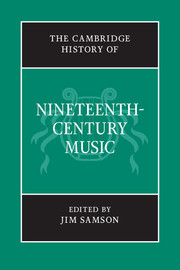Book contents
- Frontmatter
- Part One 1800–1850
- 1 The musical work and nineteenth-century history
- 2 Music And the rise of aesthetics
- 3 The profession of music
- 4 The opera industry
- 5 The construction of Beethoven
- 6 Music and the poetic
- 7 The invention of tradition
- 8 Choral music
- 9 The consumption of music
- 10 The great composer
- Part Two 1850–1900
- Chronology
- Institutions
- Personalia
- Index
- References
8 - Choral music
from Part One - 1800–1850
Published online by Cambridge University Press: 28 March 2008
- Frontmatter
- Part One 1800–1850
- 1 The musical work and nineteenth-century history
- 2 Music And the rise of aesthetics
- 3 The profession of music
- 4 The opera industry
- 5 The construction of Beethoven
- 6 Music and the poetic
- 7 The invention of tradition
- 8 Choral music
- 9 The consumption of music
- 10 The great composer
- Part Two 1850–1900
- Chronology
- Institutions
- Personalia
- Index
- References
Summary
The decline of traditional choral foundations
Johann Nikolaus Forkel paints a grim picture of the state of German choral foundations in 1801. Now that music is dominated by the untutored tastes of the ‘Liebhaber’ its necessity as a serious fundamental of education and worship is eroded:
but so much comes out of the fact that it is mainly the lack of knowledge in musical things, that brings about musical disaster, that has led so many men, and still leads them, to desire an ever greater reduction of music in churches and schools, and will finally take things so far that it will either completely rob the church of its most powerful means of devotion or at least bring it so low that no enlightened Christian can any longer hold it for a means of devotion.
What seems particularly ironic about Forkel’s statement is his sense that a modern Christian should be ‘enlightened’ (later he notes that the Enlightenment has brought many improvements to religion, if not yet to religious music). It was, after all, the Enlightenment that had swept away the last vestiges of music as a fundamental of education. The scholastic notion of music theory as the basis of mathematics and cosmic order survived into the early eighteenth century, and some of this traditional prestige reflected on music’s more practical, rhetorical function as an adornment of liturgy and a medium of scriptural interpretation. The Enlightenment brought both a demystification of the powers of music and a turn away from the general hegemony of religion per se. If music was no longer central to the academic core of education, if the educational establishments were less intimately connected with the church and if the churches no longer recognised any special spiritual power in music, the decline that Forkel observes seems hardly surprising.
- Type
- Chapter
- Information
- The Cambridge History of Nineteenth-Century Music , pp. 213 - 236Publisher: Cambridge University PressPrint publication year: 2001

